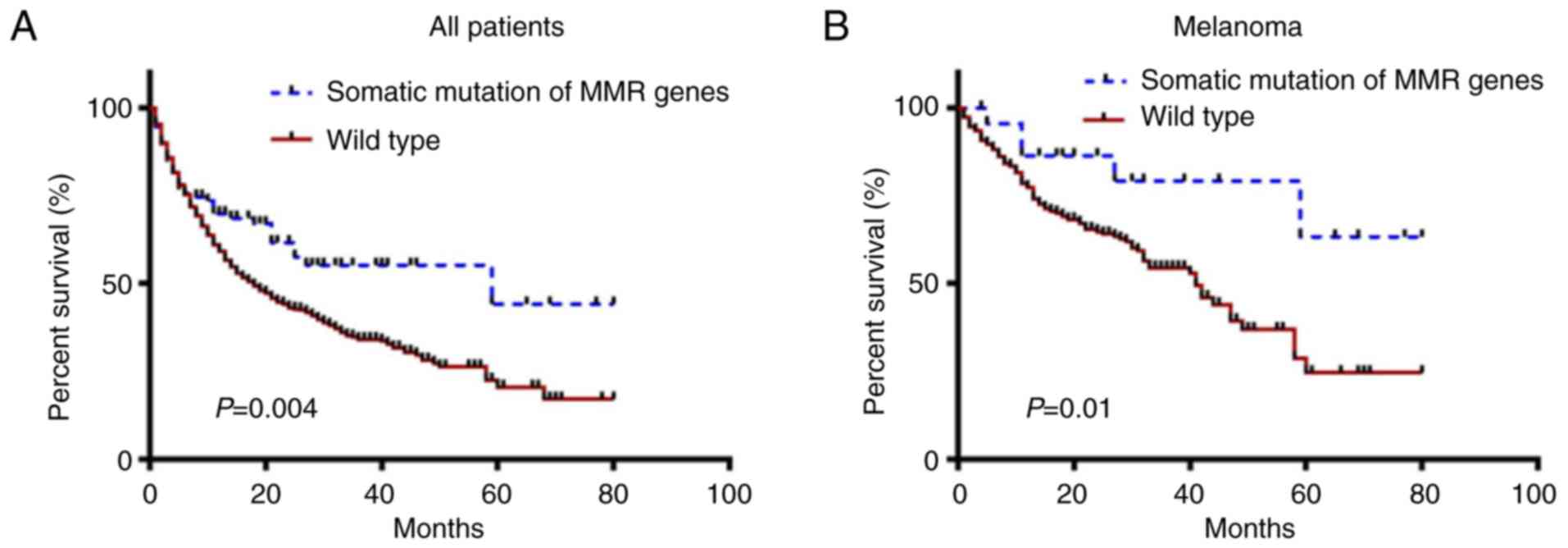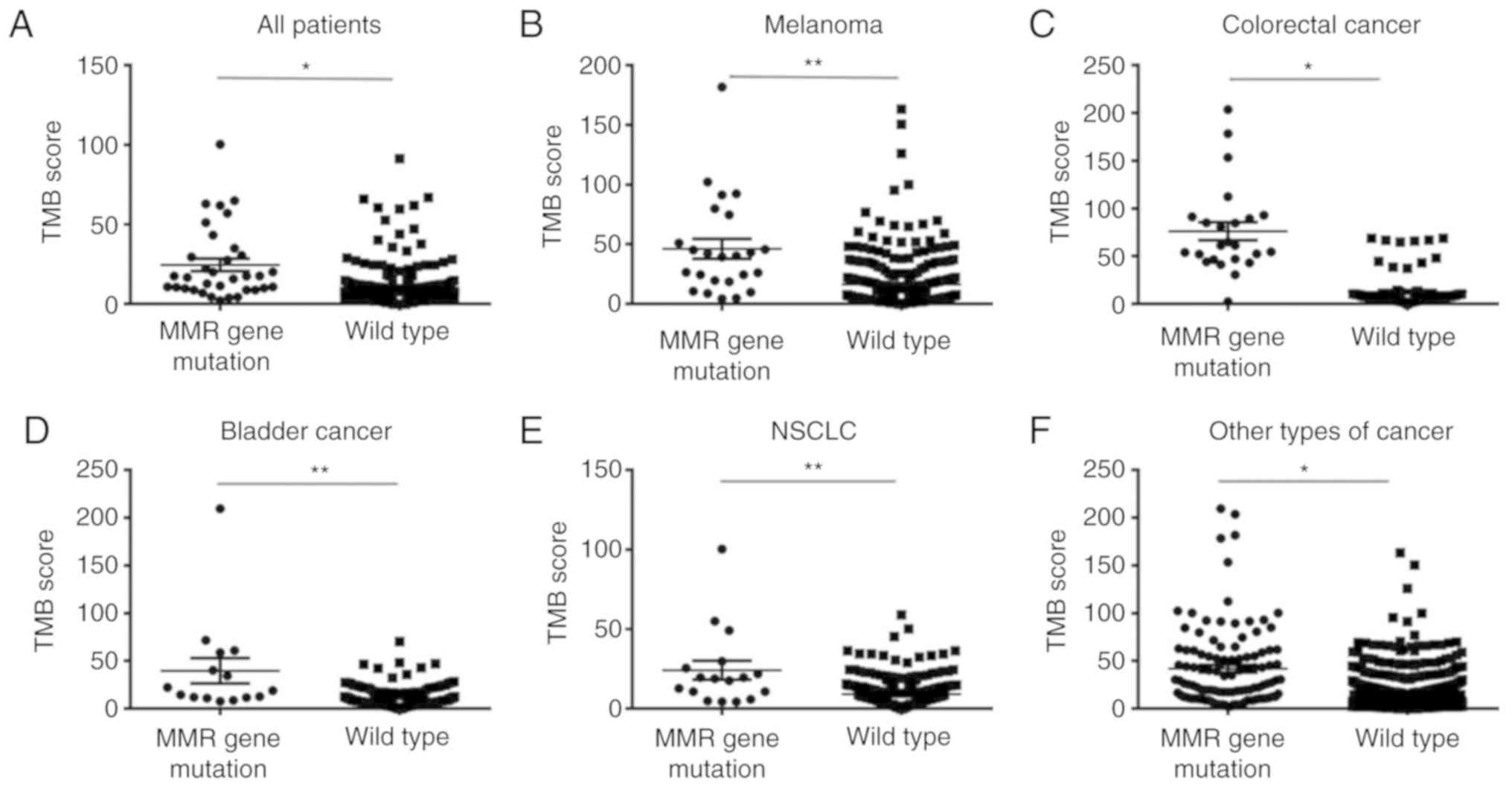|
1
|
Lemery S, Keegan P and Pazdur R: First FDA
approval agnostic of cancer site-when a biomarker defines the
indication. N Engl J Med. 377:1409–1412. 2017. View Article : Google Scholar : PubMed/NCBI
|
|
2
|
Le DT, Uram JN, Wang H, Bartlett BR,
Kemberling H, Eyring AD, Skora AD, Luber BS, Azad NS, Laheru D, et
al: PD-1 Blockade in tumors with mismatch-repair deficiency. N Engl
J Med. 372:2509–2520. 2015. View Article : Google Scholar : PubMed/NCBI
|
|
3
|
Le DT, Durham JN, Smith KN, Wang H,
Bartlett BR, Aulakh LK, Lu S, Kemberling H, Wilt C, Luber BS, et
al: Mismatch repair deficiency predicts response of solid tumors to
PD-1 blockade. Science. 357:409–413. 2017. View Article : Google Scholar : PubMed/NCBI
|
|
4
|
Mills AM, Liou S, Ford JM, Berek JS, Pai
RK and Longacre TA: Lynch syndrome screening should be considered
for all patients with newly diagnosed endometrial cancer. Am J Surg
Pathol. 38:1501–1509. 2014. View Article : Google Scholar : PubMed/NCBI
|
|
5
|
Giardiello FM, Allen JI, Axilbund JE,
Boland CR, Burke CA, Burt RW, Church JM, Dominitz JA, Johnson DA,
Kaltenbach T, et al: Guidelines on genetic evaluation and
management of Lynch syndrome: A consensus statement by the US
Multi-society task force on colorectal cancer. Am J Gastroenterol.
109:1159–1179. 2014. View Article : Google Scholar : PubMed/NCBI
|
|
6
|
Haraldsdottir S, Hampel H, Tomsic J,
Frankel WL, Pearlman R, de la Chapelle A and Pritchard CC: Colon
and endometrial cancers with mismatch repair deficiency can arise
from somatic, rather than germline, mutations. Gastroenterology.
147:1308–1316.e1. 2014. View Article : Google Scholar : PubMed/NCBI
|
|
7
|
Wang F, Wei XL, Wang FH, Xu N, Shen L, Dai
GH, Yuan XL, Chen Y, Yang SJ, Shi JH, et al: Safety, efficacy and
tumor mutational burden as a biomarker of overall survival benefit
in chemo-refractory gastric cancer treated with toripalimab, a PD-1
antibody in phase Ib/II clinical trial NCT02915432. Ann Oncol.
30:1479–1486. 2019. View Article : Google Scholar : PubMed/NCBI
|
|
8
|
Samstein RM, Lee CH, Shoushtari AN,
Hellmann MD, Shen R, Janjigian YY, Barron DA, Zehir A, Jordan EJ,
Omuro A, et al: Tumor mutational load predicts survival after
immunotherapy across multiple cancer types. Nat Genet. 51:202–206.
2019. View Article : Google Scholar : PubMed/NCBI
|
|
9
|
Hellmann MD, Ciuleanu TE, Pluzanski A, Lee
JS, Otterson GA, Audigier-Valette C, Minenza E, Linardou H, Burgers
S, Salman P, et al: Nivolumab plus ipilimumab in lung cancer with a
high tumor mutational burden. N Engl J Med. 378:2093–2104. 2018.
View Article : Google Scholar : PubMed/NCBI
|
|
10
|
Yi M, Jiao D, Xu H, Liu Q, Zhao W, Han X
and Wu K: Biomarkers for predicting efficacy of PD-1/PD-L1
inhibitors. Mol Cancer. 17:1292018. View Article : Google Scholar : PubMed/NCBI
|
|
11
|
Gubin MM, Artyomov MN, Mardis ER and
Schreiber RD: Tumor neoantigens: Building a framework for
personalized cancer immunotherapy. J Clin Invest. 125:3413–3421.
2015. View
Article : Google Scholar : PubMed/NCBI
|
|
12
|
Schumacher TN, Kesmir C and van Buuren MM:
Biomarkers in cancer immunotherapy. Cancer Cell. 27:12–14. 2015.
View Article : Google Scholar : PubMed/NCBI
|
|
13
|
Grizzi G, Caccese M, Gkountakos A,
Carbognin L, Tortora G, Bria E and Pilotto S: Putative predictors
of efficacy for immune checkpoint inhibitors in non-small-cell lung
cancer: Facing the complexity of the immune system. Expert Rev Mol
Diagn. 17:1055–1069. 2017. View Article : Google Scholar : PubMed/NCBI
|
|
14
|
Zehir A, Benayed R, Shah RH, Syed A,
Middha S, Kim HR, Srinivasan P, Gao J, Chakravarty D, Devlin SM, et
al: Mutational landscape of metastatic cancer revealed from
prospective clinical sequencing of 10,000 patients. Nat Med.
23:703–713. 2017. View
Article : Google Scholar : PubMed/NCBI
|
|
15
|
Chalmers ZR, Connelly CF, Fabrizio D, Gay
L, Ali SM, Ennis R, Schrock A, Campbell B, Shlien A, Chmielecki J,
et al: Analysis of 100,000 human cancer genomes reveals the
landscape of tumor mutational burden. Genome Med. 9:342017.
View Article : Google Scholar : PubMed/NCBI
|
|
16
|
Hanahan D and Weinberg RA: Hallmarks of
cancer: The next generation. Cell. 144:646–674. 2011. View Article : Google Scholar : PubMed/NCBI
|
|
17
|
Burrell RA, McGranahan N, Bartek J and
Swanton C: The causes and consequences of genetic heterogeneity in
cancer evolution. Nature. 501:338–345. 2013. View Article : Google Scholar : PubMed/NCBI
|
|
18
|
Cerami E, Gao J, Dogrusoz U, Gross BE,
Sumer SO, Aksoy BA, Jacobsen A, Byrne CJ, Heuer ML, Larsson E, et
al: The cBio cancer genomics portal: an open platform for exploring
multidimensional cancer genomics data. Cancer Discov. 2:401–404.
2012. View Article : Google Scholar : PubMed/NCBI
|
|
19
|
Gao J, Aksoy BA, Dogrusoz U, Dresdner G,
Gross B, Sumer SO, Sun Y, Jacobsen A, Sinha R, Larsson E, et al:
Integrative analysis of complex cancer genomics and clinical
profiles using the cBioPortal. Sci Signal. 6:pl12013. View Article : Google Scholar : PubMed/NCBI
|
|
20
|
Marcus L, Lemery SJ, Keegan P and Pazdur
R: FDA approval summary: Pembrolizumab for the treatment of
microsatellite instability-high solid tumors. Clin Cancer Res.
25:3753–3758. 2019. View Article : Google Scholar : PubMed/NCBI
|
|
21
|
Seth S, Ager A, Arends MJ and Frayling IM:
Lynch syndrome-cancer pathways, heterogeneity and immune escape. J
Pathol. 246:129–133. 2018. View Article : Google Scholar : PubMed/NCBI
|
|
22
|
Lynch HT, Snyder CL, Shaw TG, Heinen CD
and Hitchins MP: Milestones of Lynch syndrome: 1895–2015. Nat Rev
Cancer. 15:181–194. 2015. View
Article : Google Scholar : PubMed/NCBI
|
|
23
|
Eso Y, Takai A, Matsumoto T, Inuzuka T,
Horie T, Ono K, Uemoto S, Lee K, Edelmann W, Chiba T and Marusawa
H: MSH2 dysregulation is triggered by proinflammatory cytokine
stimulation and is associated with liver cancer development. Cancer
Res. 76:4383–4393. 2016. View Article : Google Scholar : PubMed/NCBI
|
|
24
|
Arora S, Velichinskii R, Lesh RW, Ali U,
Kubiak M, Bansal P, Borghaei H, Edelman MJ and Boumber Y: Existing
and emerging biomarkers for immune checkpoint immunotherapy in
solid tumors. Adv Ther. 36:2638–2678. 2019. View Article : Google Scholar : PubMed/NCBI
|
|
25
|
Teo MY, Seier K, Ostrovnaya I, Regazzi AM,
Kania BE, Moran MM, Cipolla CK, Bluth MJ, Chaim J, Al-Ahmadie H, et
al: Alterations in DNA damage response and repair genes as
potential marker of clinical benefit from PD-1/PD-L1 blockade in
advanced urothelial cancers. J Clin Oncol. 36:1685–1694. 2018.
View Article : Google Scholar : PubMed/NCBI
|
|
26
|
Türeci Ö, Löwer M, Schrörs B, Lang M,
Tadmor A and Sahin U: Challenges towards the realization of
individualized cancer vaccines. Nat Biomed Eng. 2:566–569. 2018.
View Article : Google Scholar : PubMed/NCBI
|
|
27
|
Froimchuk E, Jang Y and Ge K: Histone H3
lysine 4 methyltransferase KMT2D. Gene. 627:337–342. 2017.
View Article : Google Scholar : PubMed/NCBI
|
|
28
|
Lv J, Zhu Y, Ji A, Zhang Q and Liao G:
Mining TCGA database for tumor mutation burden and their clinical
significance in bladder cancer. Biosci Rep. 40:BSR201943372020.
View Article : Google Scholar : PubMed/NCBI
|
|
29
|
Shen J, Ju Z, Zhao W, Wang L, Peng Y, Ge
Z, Nagel ZD, Zou J, Wang C, Kapoor P, et al: ARID1A deficiency
promotes mutability and potentiates therapeutic antitumor immunity
unleashed by immune checkpoint blockade. Nat Med. 24:556–562. 2018.
View Article : Google Scholar : PubMed/NCBI
|
|
30
|
Qiu H, Zmina PM, Huang AY, Askew D and
Bedogni B: Inhibiting Notch1 enhances immunotherapy efficacy in
melanoma by preventing Notch1 dependent immune suppressive
properties. Cancer Lett. 434:144–151. 2018. View Article : Google Scholar : PubMed/NCBI
|
|
31
|
Dixon ZA, Nicholson L, Zeppetzauer M,
Matheson E, Sinclair P, Harrison CJ and Irving JA: CREBBP knockdown
enhances RAS/RAF/MEK/ERK signaling in Ras pathway mutated acute
lymphoblastic leukemia but does not modulate chemotherapeutic
response. Haematologica. 102:736–745. 2017. View Article : Google Scholar : PubMed/NCBI
|
|
32
|
Pastore A, Jurinovic V, Kridel R, Hoster
E, Staiger AM, Szczepanowski M, Pott C, Kopp N, Murakami M, Horn H,
et al: Integration of gene mutations in risk prognostication for
patients receiving first-line immunochemotherapy for follicular
lymphoma: A retrospective analysis of a prospective clinical trial
and validation in a population-based registry. Lancet Oncol.
16:1111–1122. 2015. View Article : Google Scholar : PubMed/NCBI
|
|
33
|
Mody K, Starr J, Saul M, Poorman K,
Weinberg BA, Salem ME, VanderWalde A and Shields AF: Patterns and
genomic correlates of PD-L1 expression in patients with biliary
tract cancers. J Gastrointest Oncol. 10:1099–1109. 2019. View Article : Google Scholar : PubMed/NCBI
|
|
34
|
Kared H, Adle-Biassette H, Foïs E, Masson
A, Bach JF, Chatenoud L, Schneider E and Zavala F:
Jagged2-expressing hematopoietic progenitors promote regulatory T
cell expansion in the periphery through notch signaling. Immunity.
25:823–834. 2006. View Article : Google Scholar : PubMed/NCBI
|
|
35
|
Cavalieri S, Perrone F, Miceli R, Ascierto
PA, Locati LD, Bergamini C, Granata R, Alfieri S, Resteghini C,
Galbiati D, et al: Efficacy and safety of single-agent pan-human
epidermal growth factor receptor (HER) inhibitor dacomitinib in
locally advanced unresectable or metastatic skin squamous cell
cancer. Eur J Cancer. 97:7–15. 2018. View Article : Google Scholar : PubMed/NCBI
|
|
36
|
Davis TB, Yang M, Schell MJ, Wang H, Ma L,
Pledger WJ and Yeatman TJ: PTPRS regulates colorectal cancer RAS
pathway activity by inactivating Erk and preventing its nuclear
translocation. Sci Rep. 8:92962018. View Article : Google Scholar : PubMed/NCBI
|
|
37
|
Sirkisoon SR, Carpenter RL, Rimkus T,
Anderson A, Harrison A, Lange AM, Jin G, Watabe K and Lo HW:
Interaction between STAT3 and GLI1/tGLI1 oncogenic transcription
factors promotes the aggressiveness of triple-negative breast
cancers and HER2-enriched breast cancer. Oncogene. 37:2502–2514.
2018. View Article : Google Scholar : PubMed/NCBI
|

















